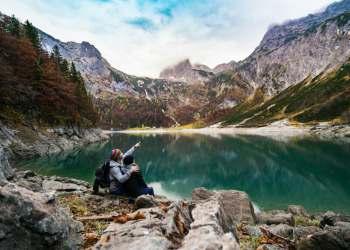Traveling the world is a dream for many, but it often comes with a hefty price tag. However, with careful planning and savvy strategies, you can explore the globe without breaking the bank. Here are some top tips for saving money while traveling abroad.
1. Introduction
Traveling is not only an opportunity to explore new cultures and landscapes but also a chance to learn valuable lessons about budgeting and financial management. In this article, we’ll delve into various ways to make your travel experience more affordable without compromising on the quality of your adventure.
2. Planning Your Trip
Before embarking on your journey, it’s essential to set a realistic budget. Research potential destinations to find ones that offer affordable options for accommodation, food, and activities. Additionally, consider traveling during the off-peak season when prices are lower.
3. Finding Affordable Accommodation
Accommodation costs can quickly add up, but there are ways to minimize expenses. Explore a range of options, including hotels, hostels, and homestays. Utilize online booking platforms to compare prices and take advantage of discounts.
4. Transportation on a Budget
Transportation expenses can vary greatly depending on your chosen mode of travel. Compare prices for flights, trains, and buses, and opt for the most cost-effective option. Once at your destination, use public transportation whenever possible to save money.
5. Eating on a Budget
Sampling local cuisine is an integral part of any travel experience, but dining out can be expensive. Look for affordable eateries frequented by locals and avoid tourist hotspots where prices tend to be inflated. Consider cooking your own meals using ingredients from local markets to save even more.
6. Saving on Activities and Attractions
There’s no shortage of things to see and do while traveling, but many attractions come with a hefty price tag. Look for free or discounted activities, such as walking tours or visiting museums on designated free days. Consider purchasing city passes or attraction bundles for additional savings.
7. Managing Currency Exchange
Currency exchange fees and unfavorable exchange rates can eat into your travel budget. Research exchange rates in advance and avoid exchanging money at airports or tourist areas where rates tend to be less favorable. Consider using credit cards that offer competitive exchange rates and low transaction fees.
8. Packing Smart
Packing efficiently can help you avoid unnecessary expenses, such as baggage fees. Bring only essential items and opt for versatile clothing that can be mixed and matched. Consider investing in reusable items, such as a water bottle or travel utensils, to reduce waste and save money.
9. Staying Safe While Saving
While saving money is important, it’s equally crucial to prioritize your safety while traveling. Be vigilant of common scams targeting tourists and take precautions to keep your valuables secure. Research safety tips specific to your destination and avoid risky areas, especially at night.
10. Maximizing Rewards and Discounts
Take advantage of loyalty programs offered by airlines, hotels, and rental car companies to earn rewards and discounts on future travel. Consider applying for a travel rewards credit card that offers perks such as bonus miles or cashback on travel purchases. Additionally, look for discounts on attractions and activities available to cardholders.
11. Connecting with Locals
One of the best ways to experience a destination on a budget is by connecting with locals. They can offer valuable insights into affordable experiences that may not be found in guidebooks. Utilize local transportation and services to immerse yourself in the culture and save money.
12. Being Flexible
Flexibility is key to finding the best deals and saving money while traveling. Remain open to changes in your itinerary and take advantage of last-minute deals on accommodation and transportation. Be prepared to adjust your budget as needed to accommodate unexpected expenses.
13. Monitoring Expenses
Keeping track of your spending is essential to staying within your budget while traveling. Use budgeting apps or spreadsheets to monitor expenses in real-time and identify areas where you can cut back. Adjust your budget as needed to ensure you stay on track throughout your trip.
14. Overcoming Language Barriers
While language barriers can present challenges while traveling, there are ways to overcome them. Learn basic phrases in the local language to facilitate communication and show respect for the culture. Utilize translation apps or seek assistance from locals or hotel staff when needed.
15. Conclusion
Traveling abroad doesn’t have to break the bank. By implementing these top tips for saving money while traveling, you can enjoy an affordable and unforgettable adventure around the globe. Remember to plan ahead, stay flexible, and prioritize experiences that enrich your journey without emptying your wallet.

FAQs After The Conclusion
1. How can I save money on flights?
Research and book flights in advance, be flexible with travel dates, and consider budget airlines for affordable options.
2. Are hostels safe for solo travelers?
Many hostels offer safe and social environments for solo travelers, but it’s essential to research and read reviews before booking.
3. What are some affordable ways to explore a new city?
Take advantage of free walking tours, visit local markets, and utilize public transportation to explore a new city on a budget.
4. How can I avoid overspending while traveling?
Set a daily budget, track your expenses, and prioritize experiences that align with your interests and budget.
5. Is it cheaper to exchange currency at home or abroad?
Exchanging currency at home often offers better rates and avoids fees associated with exchanging money abroad.
6. What are the benefits of using a travel rewards credit card?
Travel rewards credit cards offer perks such as bonus miles, cashback on travel purchases, and travel insurance coverage.
7. How can I stay safe while traveling alone?
Research destinations in advance, stay aware of your surroundings, and avoid risky situations or areas, especially at night.
8. What should I do if I encounter a language barrier while traveling?
Learn basic phrases in the local language, utilize translation apps, and seek assistance from locals or hotel staff when needed.





